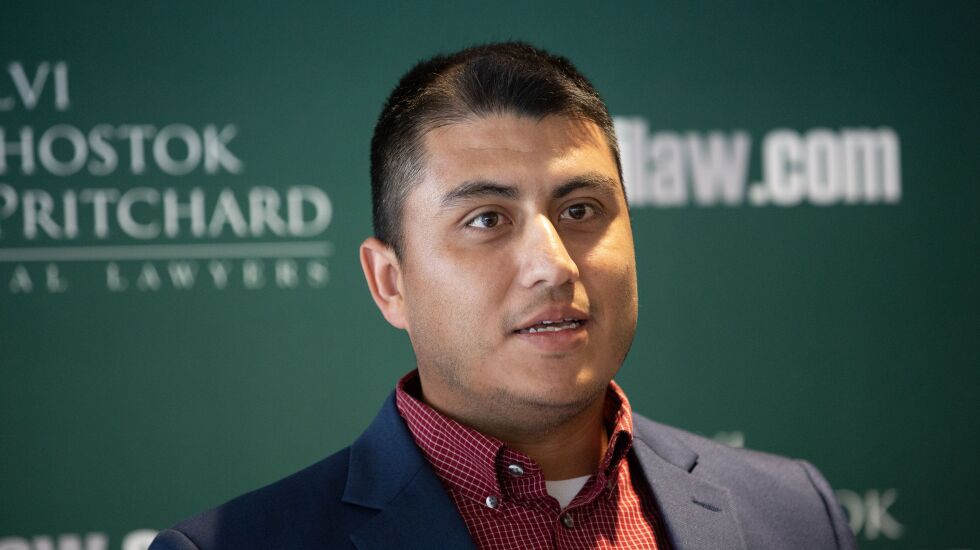
The first Hispanic former Northwestern University football player to speak about hazing in the school’s sports program says he underwent racist taunts that included the team shaving the words “Cinco de Mayo” on the back of his head.
The experience led Ramon Diaz, now 36, to try to kill himself by overdosing on painkillers in 2006.
“My experience playing football at Northwestern University haunts me to this day,” Diaz told reporters Wednesday. “I never will forget the mistreatment that I experienced for those four years.”
Diaz was an offensive lineman for NU, first under head coach Randy Walker in 2005, then Pat Fitzgerald from 2006 to 2008. He is the oldest former player to speak publicly about the alleged abuse.
His lawyers, Patrick Salvi II and Parker Stinar, plan to file a lawsuit on his behalf Wednesday. It is at least the seventh lawsuit filed against Northwestern since the hazing scandal became public July 7 when the school released details about an internal investigation into hazing allegations.
The school said it has revised its hazing reporting practices, implemented anti-hazing training and will monitor locker rooms. The university on Tuesday said it hired former U.S. Attorney General Loretta Lynch to review the school’s abuse reporting mechanisms. Her report will be shared publicly when completed, the school said.
In response to Diaz’s comments Wednesday, a Northwestern spokesman said the school is committed to addressing hazing-related issues.

Diaz said he chose to speak Wednesday “to be an advocate” for the young men and women who’ve already come forward.
He said the trauma he endured led him to become a clinical psychologist. He’s a doctoral student in psychology.
Diaz remembers sitting in a chair at the team’s camp in Kenosha, Wisconsin, not knowing that players were about to inscribe the words “Cinco de Mayo” into the back of his head.
“As I played this out in my life for the last 10 years or longer, I often ask myself, ‘Why that symbol? Why me? You could’ve chosen anything,’” Diaz said.
One coach taunted him about his father’s upbringing in Mexico on dirt floors, he said.
“You said on many occasions that even though I grew up on dirt floors, we don’t live like that here,” Diaz said. “Those words ring true to me like they happened yesterday.”
Diaz said he hasn’t watched a football game in a decade because of that abuse.
His lawyers also alleged that Diaz was forced to participate in a hazing tradition called the “carwash.” Players lined up naked, covered in soap, spinning around at the entrance of the showers while freshman players were forced to rub up against the line of men to get to their showers.
Salvi on Wednesday said the university’s new investigation appears to be broader than the original one, which focused on the football team and led to head coach Fitzgerald’s firing.
Salvi again called on the university to share its full, initial investigation into hazing and the accounts of hazing from other former students.
“These are stories that need to be heard ... so that Northwestern can, in essence, cleanse itself of the problems they’ve had for a very long time and move forward,” Salvi said.
Diaz said his memories of NU “are, for the most part, very traumatizing.”
He endured four years of abuse because of pressure to complete his sports scholarship. His last memory of playing on the team was sneaking into the empty locker room to grab his belongings. Diaz skipped his graduation ceremony and had his diploma shipped to his home.
“I did not want to walk. I didn’t get a gown,” Diaz said. “I just wanted to move back and be with my family.”







